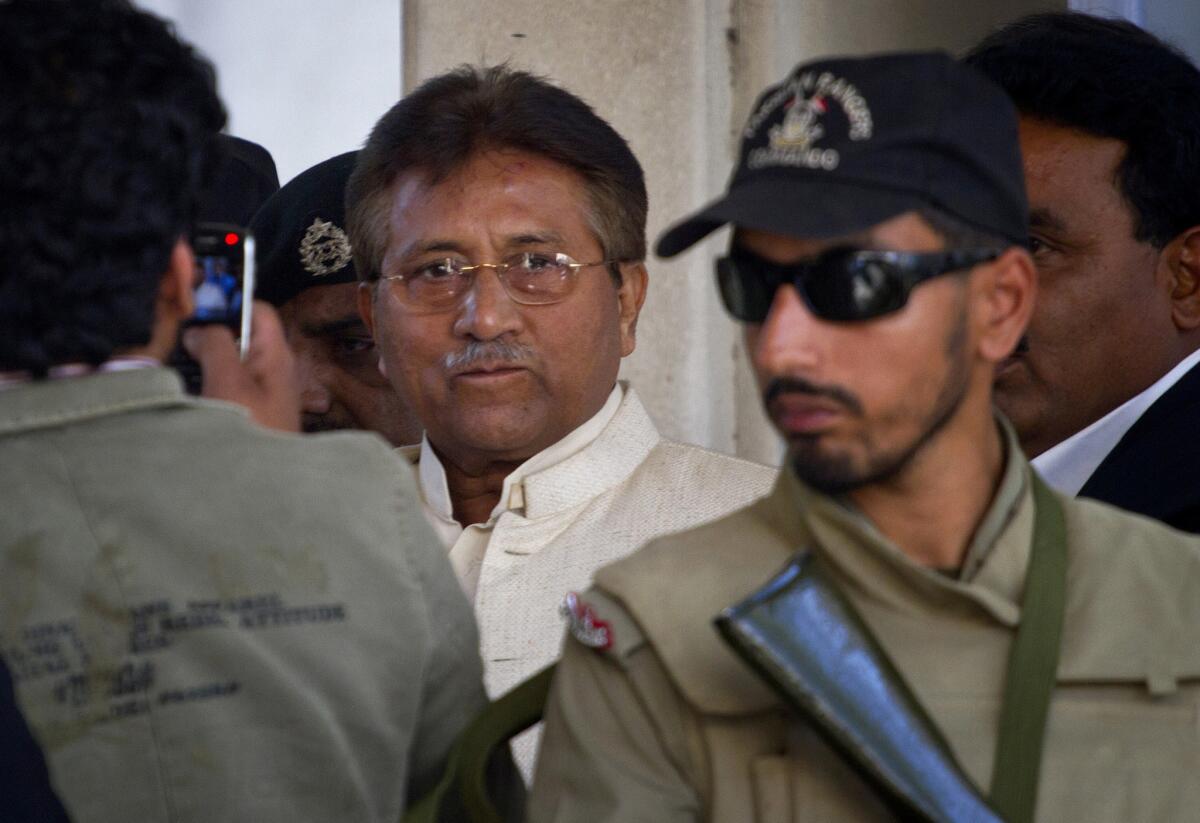Pakistan says it will put former ruler Musharraf on trial for treason

ISLAMABAD, Pakistan — Pakistan will try former military ruler Gen. Pervez Musharraf on treason charges, which carries life imprisonment or the death penalty, for enacting emergency rule in 2007, the interior minister said Sunday.
The government on Monday will name a special prosecutor and ask the Supreme Court to set up a three-judge tribunal to initiate proceedings against Musharraf under Article 6 of the constitution, he said. That article defines treason.
“The decision has been taken in the national interest,” Interior Minister Chaudhry Nisar Ali Khan told a press conference. “It is happening for the first time in the history of Pakistan.”
The army and security services have long held inordinate power in Pakistan, and Musharraf, 70, would be the first military ruler to face treason charges in a nation that has witnessed three military coups in its 66-year history. Musharraf has maintained his innocence.
Musharraf, a general and former army chief who assumed power in a coup, is also charged in several other criminal cases dating back to his 1999-2008 rule, including one tied to the 2007 assassination of former Prime Minister Benazir Bhutto.
Khan said Musharraf committed crimes against the people of Pakistan and against the constitution. He said that no one, not even the prime minister, could pardon Musharraf, adding that the government has no vendetta against him.
Sunday’s announcement defied expectations that there might be a deal allowing him to leave the country. He’s been granted bail in his various cases, and a court was expected to rule Monday on an application allowing him to leave the country to visit his sick mother in Dubai.
Some analysts said the decision to bring new charges may be a diversionary tactic by the government. “It’s a pure political decision to avert public attention from the rather glaring incompetence of the government,” said Raza Rumi, an Islamabad-based analyst. “Musharraf can be punching bag when there’s a severe crisis of governance.”
Prime Minister Nawaz Sharif’s government, elected in May, has seen many of its core programs founder, including moves to improve the economy, bolster security and negotiate with the Taliban, which has pledged a series of “revenge attacks” after its leader was killed recently in a U.S. drone attack. And in the past few days, sectarian attacks have killed a dozen members of the minority Shia Muslim community in Rawalpindi outside the capital.
Analysts said the timing of the apparent treason charges was surprising given that a new army chief is expected to be named within a few weeks, and the military tends to protect its own. This may be an attempt to show the army that the civilian government is in charge, analysts added, but that carries risks.
“The army won’t like it that a case of treason has been brought against its ex-chief,” said Sheikh Rasheed, a lawmaker and former information minister under Musharraf, adding that this case in effect is an accusation against the military as a whole.
Musharraf imposed emergency rule in 2007, suspending parliament and the constitution and firing senior judges who then declared his actions illegal and unconstitutional. Sharif was the leader Musharraf ousted from power in 1999.
Musharraf resigned in August 2008 and left the country.
He returned to Pakistan in March after years of self-imposed exile -- reportedly against the advice of allies in the army -- apparently hoping to be embraced by voters in the May election. Instead, he was banned from politics for life and charged in the criminal cases. Sharif won the general election decisively.
In April, Musharraf was put under house arrest at his farmhouse on the outskirts of Islamabad, another first for a former army chief in Pakistan. He remained there until last week, when was released after receiving bail in a case related to the killing of a cleric during a military operation against the hard-line Lal Mosque in 2007.
Musharraf had already been granted bail in other cases involving Bhutto’s assassination and the imposition of emergency rule in 2007.
Some Twitter users said the treason charges were ill-timed and smacked of an effort by the government to distract the electorate. “Faced with accusations of incompetency? Evoke drone issue or start cursing Musharraf. Then retire back to your bubble,” wrote @NadeemfParacha. “Great idea. Let’s talk about Musharraf today. That’s of course the most important issue. Flux sectarian killings & national chaos,” echoed @faisalqureshi.
ALSO:
India’s beloved cricket star Tendulkar retires
Filipinos seek solace from typhoon at ruined churches
Mexico’s enduring problems: The missing and the unidentified dead
Special correspondent Sahi reported from Islamabad and Times staff writer Magnier from New Delhi.
More to Read
Start your day right
Sign up for Essential California for news, features and recommendations from the L.A. Times and beyond in your inbox six days a week.
You may occasionally receive promotional content from the Los Angeles Times.





